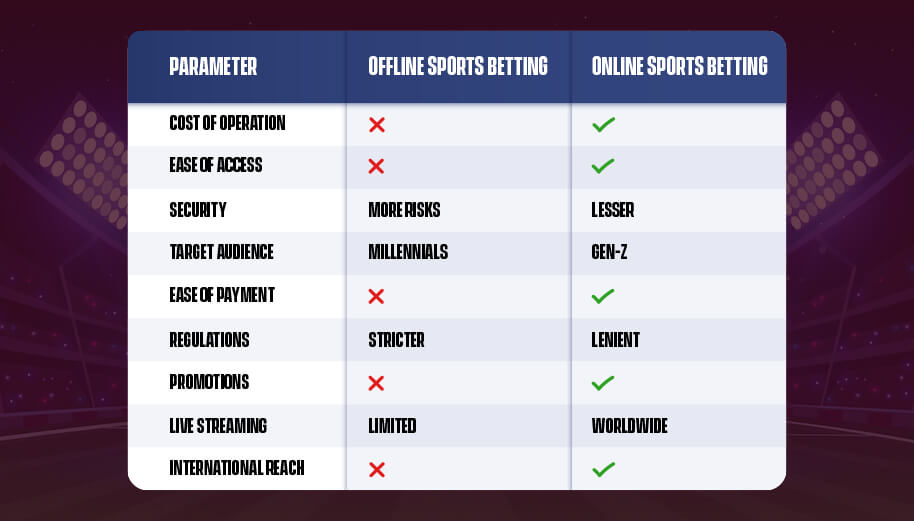TABLE OF CONTENTS
- 1.What is an Online Sports Betting Business?
- 2.Pros & Cons of Online Sports Betting Business
- 3.Types of Online Sports Betting Businesses
- 4.What is Offline Sports Betting Business?
- 5.Pros & Cons of Offline or Land-based Sports Betting Business
- 6.Comparison of Offline and Online Sports Betting Businesses
- 7.Challenges Faced by Online & Offline Sports Betting Business
- 8.Why Should You Start Your Own Sports Betting Business?
- 9.Frequently Asked Questions

Sports betting is a booming industry, and it seems like everyone wants to get in on the action.
Online sports betting has become increasingly popular in recent years. With so many options available, it’s hard to know where to start. If you’re thinking about launching your website or app that offers people the opportunity to place bets on sporting events, then you should consider offline sports betting as well.
The offline sports betting business is on the decline in favor of online sports betting. The reason for the shift is simple: convenience and accessibility. It’s not just about being able to place a bet from your home, it’s also about being able to do so from anywhere in the world.
In this article, we’ll discuss the differences between offline and online sports betting businesses and why they both have their advantages and disadvantages.
What is an Online Sports Betting Business?
Sports betting can be done in several ways, including online and via mobile devices. Online sports betting has become increasingly popular in recent years, thanks to the convenience and eases it offers.
Online sports betting sites have revolutionized the way people gamble. Instead of having to go to a bookmaker’s shop or call them on the telephone, you can now log onto your computer and make your bet from home or wherever you are with an internet connection.
Pros & Cons of Online Sports Betting Business
Pros
Cons
Types of Online Sports Betting Businesses


Sportsbook
A sportsbook is a type of betting shop that offers sports bets, usually via phone or online. Some also offer other types of gambling, such as casino and poker games. Sportsbooks may also be called bookmakers, or simply bookies.

Casino
A casino is an establishment with facilities for gambling, such as slot machines and table games. Casinos may also include rooms that have been set aside for non-gambling activities such as dining and entertainment, although this can be considered a separate business model known as a resort. In modern English, the term "casino" tends to refer to large casinos or resorts with multiple luxury hotels, high-end food, and entertainment options, while smaller establishments are commonly called "saloons".

Poker Rooms
Poker rooms are sites where people can go to play poker with other people over the Internet through their computers or mobile devices. Poker rooms offer different types of games including Texas Hold'em (the most popular), Omaha, Seven Card Stud, and Five Card Draw.

Betting Exchanges
Betting exchanges allow customers to bet against each other rather than against a bookmaker. The sites charge fees for each bet made, but they don't take any commission from winnings, so your profit will be higher than it would be with a traditional bookmaker.
What is Offline Sports Betting Business?
Unlike online betting, this setup enables bettors to use cash, interact with staff, and get instant payouts. Your company needs to have the necessary licenses, secure payment processing, and a good location to get people to visit you. Most offline sportsbooks also offer screens to watch live matches, which makes betting more exciting. If you are interested in a hands-on sports betting company, an offline setup can be a good idea.
Pros & Cons of Offline or Land-based Sports Betting Business
Pros
Cons
Social Interaction – You can engage with other bettors and enjoy the atmosphere
Comparison of Offline and Online Sports Betting Businesses
Usually, it is a brick-and-mortar business that has physical locations where customers can come in person to place their bets. The business may also have an online presence, where customers can place their bets through the company’s website or mobile app.
The main difference between these two types of sports betting businesses is that offline businesses have physical locations where people can go to place their bets. This gives them an advantage over online-only companies because they have more opportunities to advertise and promote themselves to potential clients.
Here are various points that compare offline and online betting platforms.

Cost of Operation
Offline sports betting businesses are more expensive than online ones. This is because offline sports betting businesses require more space and manpower. Offline sports betting businesses require a physical location, which means you need to pay rent or mortgage on that property. If you're running an online business, there's no need for such overhead costs. You also have to pay employees, who are often part-time or seasonal workers in an offline setting. Another thing to consider is how much money you'll be investing in advertising and marketing for your business. Offline sportsbooks can spend thousands of dollars on billboards, radio ads, and television commercials to promote their brands, but online sportsbooks don't need those same kinds of expenses because they can reach customers through other channels like Google Adwords and social media marketing campaigns instead.
Ease of Access
The ease of access is a major reason why the online sports betting business is growing so rapidly. A person can be sitting in his living room, place a bet with his mobile phone or computer and have the results within seconds. In contrast, placing a bet in an offline sportsbook is not as easy and convenient. You need to drive or walk to get there, then wait in line before you can place your bet. If you are placing multiple bets, then it can take quite some time until you have finished all your transactions.
Security
The security of your business is a top priority for both offline and online sports betting businesses. Unfortunately, numerous risks can be associated with both types of businesses. For example, if you run an offline sportsbook, you need to ensure that all of your employees are treated fairly and paid on time. This can be difficult to do when you have dozens or even hundreds of employees working in different locations across the country or world. If you run an online sportsbook, you may be at risk for hacking attempts, which can compromise your data integrity and even result in the loss of funds. You can reduce this risk by using security measures such as firewalls and antivirus software programs, but no business is completely immune to being hacked.
Target Audience
The target audience of sports betting companies is quite varied. The first group is the millennials who prefer to bet offline. The second group is the Gen-Z who prefer to bet online. The target audience for offline betting companies is millennials. This is because they want to experience the thrill of watching their favorite sports, teams, and players in person. They also like to socialize with other fans and watch the game together with them. The target audience for online betting companies is Gen-Z who are accustomed to using the internet. These days, they have access to all kinds of information through the internet, including sports betting sites and information about their favorite teams and players. They are also familiar with how to navigate these sites and make bets on their favorite teams and players.
Ease of Payment
One of the reasons why people prefer to place bets online is that it’s very easy and convenient. They can do it from anywhere, anytime, and don’t have to go through any hassle of going to a physical location. While this is true for both types of sports betting businesses, there are still some differences between offline and online sports betting businesses. In the case of online sports betting businesses, they have an easier time with payment processing. This is because they can use credit cards, debit cards, PayPal, and other forms of e-wallet services like Skrill or Neteller. Most offline sports betting businesses don’t accept credit cards as well as other options for payment processing. To make payments in these kinds of businesses, people need either cash or cash equivalent cheques as well as money orders which can be quite inconvenient at times especially if you are planning on making a large bet or placing multiple bets at once.
Regulations
The main difference between offline and online sports betting businesses is the regulations surrounding them. Offline businesses tend to be heavily regulated by governments to prevent money laundering and other illegal activities. Online businesses have fewer regulations because of their ability to operate from anywhere in the world. At present, offline sports betting is regulated more strictly than online sports betting. Offline sportsbooks are required to pay taxes on all of their income, as well as pay for licenses in each state where they operate. In addition, offline operators must keep records of every bet placed by their customers, which is not required for online betting sites.
Promotions
The way that promotions are run is very different between offline and online sports betting businesses. In an offline business, promotions can be difficult to implement due to the lack of technology available. Online businesses can use apps and websites to make it easy for customers to claim promotional offers and rewards. In addition, online businesses can offer a wide range of promotions at any time of year whereas offline businesses have limited options for this type of marketing activity. For example, you might only be able to offer free bets during certain times of year because it's too expensive otherwise.
Live Streaming
Sportsbooks offer live streaming services so that players can watch their favorite sports events while they are happening. This makes it possible for players to quickly place a bet on an event based on what they are seeing in real-time. It is possible for players who play online sportsbooks to watch live streams from different channels. Online sports betting businesses can offer live streaming of events to their customers. This is an excellent way for them to attract new customers and retain existing ones. Customers can also use live streaming to watch their favorite teams play from the comfort of their own homes. Offline sports betting businesses do not have this luxury, as they need to be physically present at the venue if they want to place a bet on a particular game or match.
International Reach
One of the biggest differences between offline and online sports betting businesses is their international reach. Offline sports betting businesses can only operate within the country they are based in, while online sports betting companies can operate all over the world. This means that an online company can offer services to customers from all over the world, while an offline company can only operate within one country's borders. Online companies also have a much larger range of products available to them than offline companies, who usually only offer bets on sporting events in their own country (and sometimes only for certain events). For example, if you wanted to bet on an English Premier League match tonight but were based in Australia, then you would be unable to do so at any Australian offline betting shops because they don't offer these kinds of bets. However, if you were able to access an online sportsbook offering these kinds of bets, then you could place your wagers from anywhere around the world (as long as it's legal where you live!).
Challenges Faced by Online & Offline Sports Betting Business
Challenging Aspects
Online Sports Betting Business
Offline Sports Betting Business
Why Should You Start Your Own Sports Betting Business?

These statistics show how massive the industry is and why you should consider investing in a white-label sports betting platform.

The Current Market Size
One of the biggest benefits of online sports betting is that it allows you to place bets from anywhere in the world. This means that you don’t have to live near a physical betting shop or casino to place your bets. As long as you have an internet connection, you can make money from anywhere in the world owing to the current internet sports betting services market! According to research by Business Wire, the global market size for online sports betting was $29.8 billion back in 2010. This figure is up 13% between 2010 and 2020 and it shows no signs of stopping anytime soon!

Growth Rate of Online Sports Betting
Online sports betting has grown at a rapid pace over the past few years and this trend looks set to continue into 2020 and beyond. According to Custom Market Insights, the sports betting market size will grow to $146.6 Billion by 2030. Europe has dominated the gambling market with legalization in countries like Germany, France, Spain, Italy, Malta, etc. However, in the upcoming years, Asia Pacific is predicted to take lead as governments loosen the laws concerning online gambling. As per Business Research Company, market leaders can take advantage of technologies such as AR (Augmented Reality), VR (Virtual Reality), AI (Artificial Intelligence), big data, etc., to enhance their performance and reach.
iGamingBook: The Most Secure White Label Sports Betting Software Provider
Our team will help you set up your account, customize your website and configure your servers so that they are ready for deployment on day one. Our team of experts will also be available to assist you with any technical issues that may arise during the initial launch phase.
Our team is composed of experienced developers who understand the intricacies of sports betting and gaming. We pride ourselves on providing the best possible experience for our clients by creating customized designs and features that seamlessly integrate with their existing infrastructure.
Our sports betting software is designed to be 100% compliant with all major jurisdictions, so you can rest assured that everything we build will meet or exceed local requirements.
Frequently Asked Questions
What are the disadvantages of the online sports betting business?
One of the disadvantages of the online sports betting business is that there is no physical contact between the players and their clients. There can be misunderstandings due to miscommunication or lack of communication between them which can lead to huge losses for both parties involved in the transaction.
What are the benefits of the online sports betting business?
If you're looking for a business that has high potential and at the same time is not too risky, then you should consider online sports betting. The advantages of this kind of business are as follows:
Are betting odds better online?
There is a common misconception that betting odds are better online. This is not the case.
Why is online betting becoming so popular?
There are several reasons for the popularity of online betting such as more betting choices, convenience, safety, low fees, and high payouts, etc.
Is the sports betting business profitable?
Yes, sports betting can be profitable if managed properly. Online betting has higher exposure and lower operating costs than offline betting that serves local clients. Success depends on market demand, legislation and regulation, and adopted technology. An efficient sportsbook software provider like iGamingbook can maximize profits.
How do regulations differ for offline and online sports betting?
Offline betting is governed by local licensing laws and land-based betting acts. Online betting is governed by digital game acts, payment processing laws, and cyber security policies. Some governments regulate them both strictly while others impose different laws on each.
Which requires more investment, offline or online sports betting?
Offline betting is costly in terms of location, staff, and licenses. Online betting is inexpensive to establish but is costly in terms of sophisticated software, strong security, and internet advertising. Partnering with a reliable sportsbook software provider such as iGamingbook can reduce technical costs and enhance efficiency.
Sources
- https://www.thebusinessresearchcompany.com/report/gambling-market#:~:text=Gambling%20Market%20Size,at%20a%20CAGR%20of%207.7%25.
- https://www.globenewswire.com/news-release/2022/09/12/2513697/0/en/Global-Online-Gambling-Market-Betting-Market-Size-Worth-145-6-Billion-by-2030-at-a-12-CAGR-Custom-Market-Insights.html



